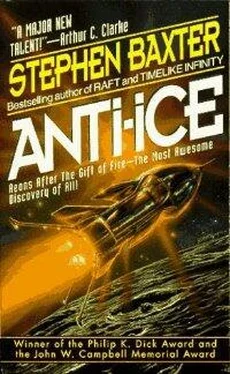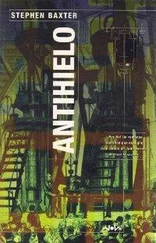But at last I awoke, as usual with the homely smell of Pocket’s toast and tea in my nostrils, knowing instantly that this was the twentieth day of our flight—the day on which Sir Josiah Traveller would land us on the surface of the Moon itself, or else take us to our deaths!
Traveller had assured us that we would land at around eight in the morning; and so Pocket awoke us a little earlier than usual, at five. We washed quickly and ate a healthy breakfast. Traveller insisted on this, even though I for one could scarcely swallow a mouthful. I fed Bourne and allowed him to wash sketchily. Pocket climbed through the hatch to bring Traveller this last breakfast at his station on the Bridge.
With the meal completed and the debris hastily stowed away, we prepared for our descent. Traveller had explained to us that at ten minutes past seven his engines would fire one almighty burst, designed to knock us into a path which must inevitably meet the lunar surface.
I ensured that Bourne was correctly restrained by his safety straps. The Frenchman’s feet and hands were also knotted together by leather belts; pale, obviously frightened, he averted his eyes with a trace of defiance. I pushed away from him, reached my own seat, and began to haul the straps around me—and then, with an oath, pulled myself across the Cabin once more and, with fingers stiffened by anger, loosened the bindings around Bourne’s wrists. Bourne neither aided nor abetted me.
Holden, already in his place, shouted angrily, “Ned! What in God’s name are you doing? Will you loose that animal amongst us, at such a moment?”
I turned on him, feeling my face flush with fury. “He is not an animal, George. He is a human being, a brother to any of us here. We may be going to our deaths today. Whatever his crimes, Bourne deserves to meet his fate with dignity.”
Holden made to protest further, but Pocket, strapped tightly in his own chair, called out, “Please postpone your debate, sirs, for I fear that the engines are about to ignite, and the young gentleman will be injured if he does not resume his seat forthwith.”
A glance at Traveller’s Great Eastern clock, still sitting proudly in its case at the center of the Cabin after all our adventures, showed me that it was already eight minutes past the hour. So with haste I returned to my chair and strapped myself in. We sat for long seconds; I avoided the others’ eyes for fear of finding only the reflections of my own terror…
Then the great engines spoke once more.
I was pressed deep into my seat, and I envisaged our precious water being thrust as freezing steam into space. The rockets fired for perhaps two minutes—and then, as suddenly as they had awoken, they fell silent. An ominous quiet descended on the Cabin, and we stared at each other wildly.
From the Bridge there was no sound.
“Holden, what has happened?” I hissed. “Do you think it worked? Are we heading to the Moon?”
Holden bit his lip, his round face red and moist with fear. “The engines fired on cue, at any rate,” he said. “But as to the rest, I am scarcely qualified to judge. As with so much of this horrible adventure, we are reduced to waiting and seeing.”
The minutes stretched out without event, and my fear became supplemented by boredom and irritation. “I say, Holden, I know Traveller is a great man—and that one must expect such chaps to display the odd eccentricity—but all the same, it seems inhuman to keep us sitting down here in suspense like this.”
Holden turned to the servant. “Pocket? Do you think we should check if Sir Josiah is well?”
Pocket shook his thin head, and I saw how sweat beaded over the bristles of hair at his neck. The manservant, restrained by circumstance from his customary round of chores, seemed the most nervous of all of us. “Sir Josiah doesn’t like to be disturbed at his work, sir.”
I ground my fist into the palm of my hand. “But this is scarcely a normal time, damn it.”
Holden said, “I think we had best let Traveller get on with his work, Ned, and try to be patient.”
“Perhaps you’re right.” I cast about the Cabin, seeking diversion from my own thoughts, and lit on the unhappy figure of Bourne; the Frenchman sat with his head lolling against his chest, a prisoner even within this prison. I said, “I have to say again, Holden, it’s damn heartless of you to have wanted to keep this poor chap restrained still. What further damage can the fellow do?”
Holden glared at Bourne. “He is an Anarchist, Ned; and as such cannot be trusted.”
Now Bourne looked up with some defiance; in his heavily accented English he said, “I am no Anarchist. I am a Frenchman.”
I studied his thin, proud features. “You told me you took the Phaeton because of the tricolore. What did you mean?”
He fixed me with a condescending stare. “That you need to ask such a question, English, is sufficient answer.”
I felt angry that my overtures, friendly enough in the circumstances, should be treated in this way. “What the devil is that supposed to mean? Look here—”
“You won’t get any civility out of that one, Ned,” Holden said wearily. “The tricolore—the flag of their Revolution in which the rabble murdered their anointed rulers, and then turned on each other; the tricolore—which the upstart Corsican carried all over Europe; the tricolore—symbol of blood, chaos and murder—”
“Yes, but what’s it got to do with the Phaeton?”
“Think about it, Ned; try to see the last few decades from your Frenchie’s point of view. His famous Emperor is thrashed by Wellington and carted off to exile. The Congress of Vienna, which has settled the Balance of Power in Europe for all time, and which seems such a noble achievement to us, is invidious to him; for no more can he count on the division of his foes in order to spread his creed of lawlessness and riot across Europe—”
Bourne laughed softly. “I point out that we are now ruled by an Emperor, not by a Robespierre.”
“Yes,” said Holden with disdain, “by Louis Napoleon, who calls himself the bastard son of Bonaparte—”
“The nephew,” interjected Bourne. “But—despite the legitimacy of Louis’ original election to power—your King would have the Emperor replaced, would he not, by a restoration of the old monarchy?” He laughed again.
Holden ignored this. “Ned, your Frenchman has, this century, been thwarted in his ambitions of greed and lawlessness. He has been forced to witness the influence of Britain extend still further across the Continent—and the world—buttressed by the robust nature of our constitutional settlement, and the power of our industrial economy. And his resentment has grown.”
Bourne continued to laugh quietly.
Holden snapped, “Do you deny this?”
Bourne became still. “I do not deny your hegemony in Europe,” he said. “But it is based on one thing, and one thing alone: anti-ice, and your monopoly on the substance. Thus you lay your anti-ice Rails across our fields, and build your stations with English names into which English goods are brought for sale.
“And worse—worse than all this—is your hidden threat to use anti-ice as a final weapon of war. Where is your Balance of Power now, Mr. Holden?”
“There is no such intention,” Holden said stiffly.
“But you have deployed such weapons of terror already,” Bourne said, “against the Russians in the Crimea. We know what you are capable of. You British talk, and act, as if anti-ice was some supernatural outcropping of your racial superiority. It is not; your possession of it is no more than a historical accident, and yet you use this transient superiority to impose your ways, your policies, your very thinking, on the rest of mankind.”
Читать дальше












